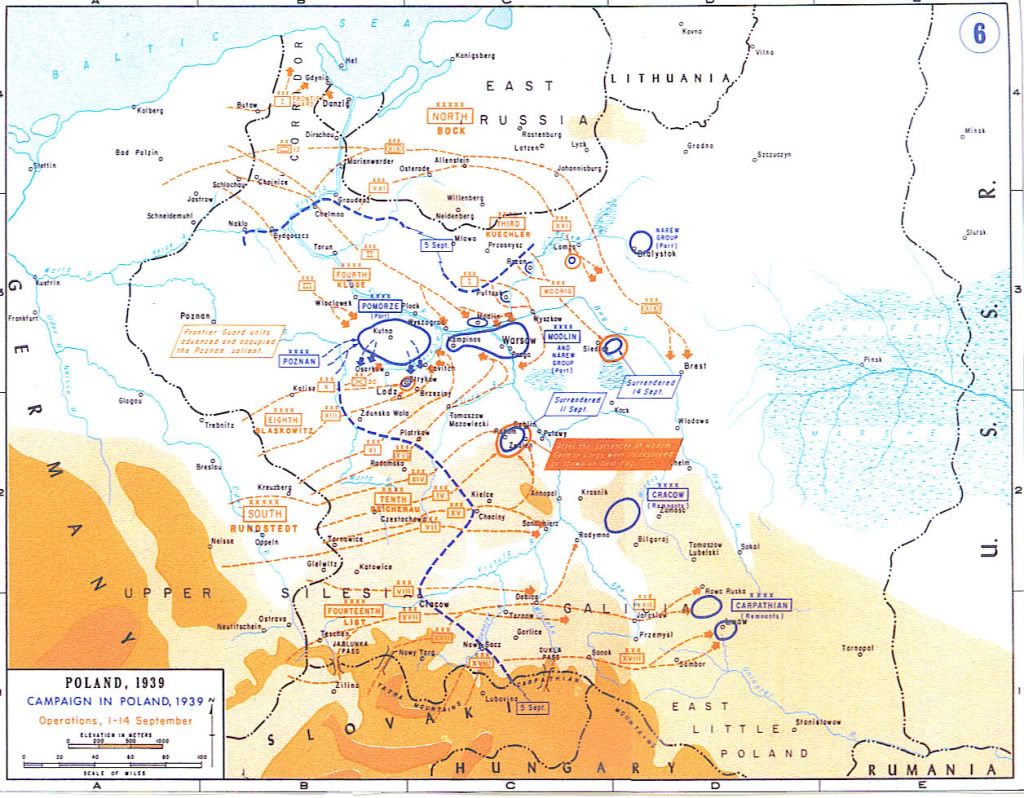
Posted on 09/02/2009 4:48:51 AM PDT by Homer_J_Simpson
































A key to the map symbols is on my profile.
http://www.worldwar-2.net/timelines/war-in-europe/eastern-europe/eastern-europe-index-1939.htm
The Germans start construction of Stutthof concentration camp in which 65,000 Polish Christians will ultimately perish.
http://www.worldwar-2.net/timelines/the-holocaust/the-holocaust-index-1939.htm
After some reflection, I felt that the average age of the Ministers who were to form the supreme executive of war direction would be thought too high, and I wrote to Mr. Chamberlain after midnight accordingly:
2.9.39
Aren’t we a very old team? I make out that the six you mentioned to be yesterday aggregate 386 years, or an average of over sixty-four! Only one year short of the Old Age Pension! If however you added Sinclair (49) and Eden (42) the average comes down to 57½.
If the Daily Herald is right that Labour will not come in, we shall certainly have to face a constant stream of criticism, as well as the many disappointments and surprises of which war largely consists. Therefore it seems to me all the more important to have the Liberal Opposition firmly incorporated in our ranks. Eden’s influence with the section of Conservatives who are associated with him, as well as with moderate Liberal elements, also seem to me to be a very necessary reinforcement.
The Poles have now been under heavy attack for thirty hours, and I am much concerned to hear that there is talk in Paris of a further note. I trust you will be able to announce our Joint Declaration of War at latest when Parliament meets this afternoon.
The Bremen will soon be out of the interception zone unless the Admiralty take special measures and the signal is given to-day. This is only a minor point, but it may will be vexatious.
I remain here at your disposal.
I was surprised to hear nothing from Mr. Chamberlain during the whole of September 2, which was a day of intense crisis. . . . I wrote that night as follows to the Prime Minister.
I have not heard anything from you since our talks on Friday, when I understood that I was to serve as our colleague, and when you told me that this would be announced speedily. I really do not know what has happened during the course of this agitated day; though it seems to me that entirely different ideas have ruled from those which you expressed to me when you said “the die was cast”. I quite realize that in contact with this tremendous European situation changes of method may become necessary, but I feel entitled to ask you to let me know how we stand, both publicly and privately, before the debate opens at noon.
It seems to me that if the Labour Party, and as I gather the Liberal Party, are estranged it will be difficult to form an effective War Government on the limited basis you mentioned. I consider that a further effort should be made to bring in the Liberals, and in addition that the composition and scope of the War Cabinet you discussed with me requires review. There was a feeling to-night in the House that injury had been done to the spirit of national unity by the apparent weakening of our resolve. I do not underrate the difficulties you have with the French; but I trust that we shall now take our decision independently, and thus give our French friends any lead that may be necessary. In order to do this we shall need the strongest and most integral combination that can be formed. I therefore ask that there should be no announcement of the composition of the War Cabinet until we have had a further talk.
As I wrote to you yesterday morning, I hold myself entirely at your disposal, with every desire to aid you in your task.
Winston S. Churchill, The Gathering Storm

If Obama were President then he’d call on Germany and Poland to end the cycle of violence.
http://www.ubootwaffe.net/ops/boat.cgi?boat=30
22.08.1939 - 27.09.1939
First Sailing - active patrol
U-30 left Wilhelmshaven under the command of Fritz-Julius Lemp on 22nd Aug 1939 for operations in the North Atlantic and arrived at return on 27th Sep 1939 after just over five weeks.
http://www.onwar.com/chrono/1939/sep39/f02sep39.htm
In Poland... Troops of German Army Group South (Rundstedt) troops are already over the Warta River in many places after rapid but expensive victories in the frontier battles. Krakow is now near the front line. In the north, 4th Army (Kluge) makes contact with the Third Army (Kuchler) from East Prussia. Two Polish divisions are destroyed while attempting to pull back through the Corridor. The Luftwaffe is spreading chaos in the Polish rear. The Polish regular troops have been stationed too far forward so the German advance is soon in their rear areas, preventing movement of reserves and completely dislocating any communication left unscathed by the repeated German air strikes in support of the ground forces. There are 6 air raids on Warsaw.
In London... Throughout the day there are frantic talks about how to oppose Germany. The British Parliament is openly opposed to the passive line that the Chamberlain government is taking and in the evening, the Cabinet decides to present an ultimatum to Germany. The National Service Act is passed, allowing for the conscription of all men aged 19-41.
In Paris... Deliberations on how to oppose the German invasion of Poland are held throughout the day. A French government decides to transmit an ultimatum to Germany. The government declares that it will fulfill its obligations to Poland.
In France... The British RAF Advanced Air Striking Force arrives. Some 10 bomber squadrons are involved in the deployment.
In Rome... Mussolini again declares Italian neutrality and calls for a 5-power peace conference.
In Berlin... The German government announces that Norwegian neutrality will be respected, provided that Britain and France do the same. Hitler rejects an offer to mediate the German-Polish dispute, made by Mussolini on August 31st and the proposal for a peace conference.
In Dublin... The Irish government declares its neutrality.
In Bern... The Swiss government orders a general mobilization.
Very detailed stuff here.
http://www.ibiblio.org/hyperwar/USA/DAP-Poland/Campaign-III.html
Third Army Operations, 2 September
Tczew (Dirschau) was taken by an engineer task force of Third Army at dawn on l2 September, but the city’s vital bridge across the Vistula was destroyed by the Poles. The task force, known as Group Medem, was unable to seize a crossing and Army Group North had to direct other units to effect crossings at Gniew (Mewe) and near Marienwerder. Third Army’s XXI Corps fought off heavy Polish counterattacks in its advance toward Grudziadz on 2 September. The bridge across the Vistula at Grudziadz was kept under artillery fire to prevent crossing
the Poles and the corps prepared to make concerted attacks against the city from north and east the following day.
On the Mlawa front I Corps failed to make any further progress, but Corps Wodrig units broke through Polish field fortifications east of the fortress city and pushed south. Panzer Division Kempf was promptly detached from the I Corps and shifted eastward to support Corps Wodrig in its advance. The Third Army plan for the force moving on Warsaw was quickly revised. Corps Wodrig was to execute an enveloping movement to take the Polish units defending Mlawa in the rear, while the 1st Cavalry Brigade secured the exposed left of the corps as it turned in its swing to the west. The two corps and the cavalry brigade would resume their southward movement in line after destroying the Polish force at Mlawa or compelling it to withdraw.
Fourth Army Operations, 2 September
Fourth Army crossed the Brda during the second day of hostilities, advancing within a few miles of the Vistula. The apprehensions about a strong Polish defense line along the Brda did not materialize. The success of the German advance was threatened for a few hours, however, when Panzer elements of XIX Corps outran their gasoline and ammunition supply. The Poles failed to gain any but a temporary advantage from this situation, and German supply columns fought their way through withdrawing Polish units to the stalled tanks.
Fourth Army gains of 2 September sealed off the Pomorze Army’s 9th Infantry Division and Pomorska Cavalry Brigade, and the 27th Infantry Division, which had been identified farther east in the Corridor. The two Polish infantry divisions were destroyed in a number of attempts to escape through the line formed by the German forces that had crossed the base of the Corridor. The cavalry brigade was shattered in a series of charges against XIX Corps’ armor, pitting mounted lancers against tanks.
The 10th Panzer Division of the army group reserve was shifted to the northeast across Fourth Army’s rear on 2 September. Bock planned to effect a crossing in the northern area of the Corridor with a strong Panzer force as soon as possible.
This is probably the most interesting one yet. I believe that the UK and France declared war on September 3rd, but it might have been the 4th.
Yes they declared war on the 3rd.
The editorial on page 30 has contemporary significance with regards to Iran.
Unrelated to the present subject, but pertinent because had it not occurred, we wouldn’t be visiting at all!
http://news.in.msn.com/national/article.aspx?cp-documentid=3201278
Sept 2: Net turns 40
OK, now I really feel old. :~0
Help is on the way, the mighty Swiss Army has mobilized.
So Churchills fear that the Labour and Liberal Parties would oppose a declaration of war turned out to be wrong?
The newspaper reports that France calls general mobilization means it has an army of 8 million “trained” men. Oh Please. I am sure it made a few readers feel a little better but that was pure pig poop.
Can you think of something to add? A different perspective?

"...The Germans sent some 2,000 aircraft into Poland on 1 September, of which 897 were bombers or dive-bombers. Apart from their ground-support role, as 'flying artillery', and the rapid destruction of the 300-strong Polish fighter force, in the air or on the ground, the Luftwaffe was also used to attack Polish cities.
"The first of these was the town of Dzialoszyn, which was bombed and dive-bombed to support ground operations launched by the German IX Corps, which 'took the city without loss.' Polish civilian losses are not recorded..."
I'll stop here for now. Note the number of warplanes -- 2,000 of which nearly 1,000 are bombers. Bombing of Warsaw first began on September 8, culminating on Sept 25 with over 1,000 sorties, reducing large portions of Warsaw to rubble and forcing its surrender.
In Poland, Germans have begun to sow the wind. They will eventually reap the whirlwind. (Hosea 8:7)
Disclaimer: Opinions posted on Free Republic are those of the individual posters and do not necessarily represent the opinion of Free Republic or its management. All materials posted herein are protected by copyright law and the exemption for fair use of copyrighted works.